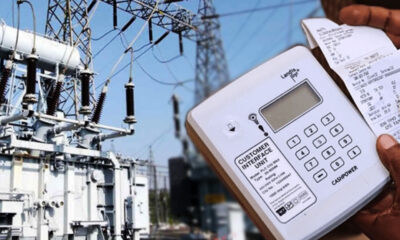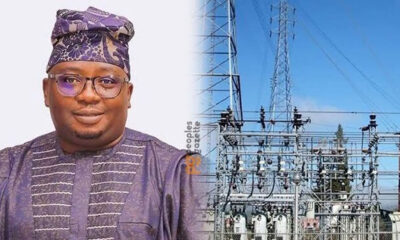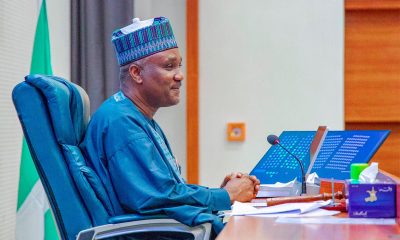News
Electricity: Meter price hits N250,000 as many strive to exit estimated billing
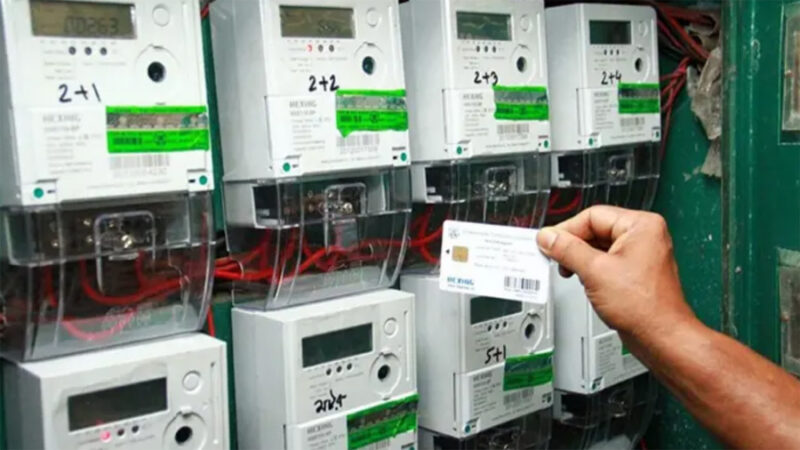
Electricity: Meter price hits N250,000 as many strive to exit estimated billing
The Nigerian Electricity Regulatory Commission’s (NERC) move to deregulate Meter Asset Providers (MAP) was hailed as the much-needed solution to the country’s persistent metering gap crisis.
However, this silver bullet has come with a price, and not just figuratively. The soaring cost of prepaid meters has added a new layer of burden for the average Nigerian household, making the dream of escaping the trap of estimated billing feel like an increasingly distant hope.
For millions of Nigerians, the sharp rise in metering costs from about N80,000 to over N200,000 in just one year has become as burdensome as the problem it was meant to solve: eliminating estimated billing.
Four months ago, NERC introduced a promising policy to deregulate both meter prices and providers, embracing a willing-buyer, willing-seller system aimed at opening up the market. This move was intended to empower customers, allowing them to obtain meters from any approved vendor without relying on the DisCos.
While this policy appeared commendable on paper, it has brought new challenges.
The most pressing of these is the increase in meter prices, exacerbated by the prevailing economic conditions and rising inflation.
READ ALSO:
- Man City beat Chelsea 2-0 in their EPL opening game
- Terrorists release abducted Nigerien soldiers after ransom payment, Putin intervention
- 200 houses destroyed in Katsina after torrential rain
According to the National Bureau of Statistics, the number of customers on estimated billing has surged from 5.83 million in Q4 2023 to 6.43 million in Q1 2024, marking a significant 10% rise.
These figures represent millions of households striving to escape the cycle of overbilling and other abuses by their distribution companies, only to find that the path to obtaining a prepaid meter has become even more difficult.
Latest Meter Prices
Following the announcement by NERC, DisCos and their meter providers partners have declared new meter prices, pointing to the deregulation policy and ailing economic conditions.
None of the new prices is below N100,000, a very sharp increase from the former price announced by NERC in September 2023.
According to the new prices by DisCos, the cost of a single phase meter rose from N81,975 to about N125,000, depending on the DisCo and the vendor the customer is purchasing from.
Different DisCos announced different prices from N120,00 for a single-phase meter to about N240,00 for a three-phase meter, a sharp increase that has made struggling Nigerians question their choices in obtaining meter and estimated billing.
Abuja DisCo:
Single Phase Meter — Between N105,000 to N131,000
Three Phase Meter — N198,000 to N220,000
Kaduna DisCo:
Single Phase Meter — Between N120,000 to N132,000
Three Phase Meter — Between N206,000 to N215,000
Ikeja DisCo:
Single Phase Meter — Between N120,000 to N125,000
Three Phase Meter — N213,000 to N225,000
Eko DisCo:
Single Phase Meter — Between N117,000 to N135,000
Three Phase Meter — Between 145,000 to N247,000
This increase in price is true for all the eleven DisCos across the country.
Electricity: Meter price hits N250,000 as many strive to exit estimated billing
News
UniAbuja Student Sadiya Usman Found Safe After Two Days Missing

UniAbuja Student Sadiya Usman Found Safe After Two Days Missing
The University of Abuja (UniAbuja) has confirmed that 100-level student Sadiya Usman has been found safe after being reported missing earlier this week. The university expressed relief and gratitude to the public and security agencies for their assistance in locating the student.
Sadiya Usman, who is enrolled in the Department of Accounting, was last seen leaving her residence at Kontagora Estate, Gwagwalada, Abuja, on Tuesday, 18 February 2026, at around 8:00 a.m. She was on her way to the university’s Main Campus to sit for her Computer-Based Test (GST 111) but did not arrive for the exam.
READ ALSO:
- Lassa Fever Deaths in Nigeria Rise to 51 After 15 Killed in Early February – NCDC
- Mob Kills Injured Motorcycle Rider After AK‑47 Rifles, Ammunition Found in Crash Scene
- Tacha Condemns False Rape Allegations After Mirabel Admits Fabrication
After her disappearance, her guardian reported her missing when all attempts to reach her by phone were unsuccessful. The university promptly activated internal safety protocols and collaborated with security agencies, campus authorities, and the public to ensure her safe recovery.
The student was eventually located late on Thursday, 20 February 2026, around 11:49 p.m., and is reported to be safe, unhurt, and in stable condition. Authorities confirmed that coordinated efforts between the university, law enforcement, and concerned members of the public were instrumental in her recovery.
The university reaffirmed its commitment to student safety and welfare, promising continuous updates as necessary. It also thanked those who responded to the public appeal for information and urged students and parents to remain vigilant about safety.
This incident highlights the importance of campus security measures, timely reporting of missing persons, and the role of community involvement in safeguarding students.
UniAbuja Student Sadiya Usman Found Safe After Two Days Missing
News
Police to Arrest TikToker Mirabel After She Recants False Rape Claim

Police to Arrest TikToker Mirabel After She Recants False Rape Claim
The Ogun State Police Command has confirmed plans to arrest and prosecute TikTok user Mirabel after she admitted that her viral rape allegation was false, authorities and investigative reports indicate.
Mirabel, a social media influencer, first sparked national attention after posting videos alleging she had been sexually assaulted in her home in Ogijo, Ogun State. The posts quickly went viral, drawing widespread outrage, calls for justice, and prompting the police to launch an immediate investigation.
An audio recording of a phone conversation, shared online by social media personality VeryDarkMan (VDM), reportedly captures Mirabel acknowledging that parts of her story were fabricated. In the recording, she apologises and admits creating a threatening TikTok account to support her narrative, claiming she had been taking drugs at the time and “was not thinking clearly” when posting the videos.
READ ALSO:
- Again, Early Morning Blaze Destroys Dozens of Shops in Kano Market
- Suspected Terrorists Warn Kebbi Residents: Pay ₦100 Million or Face Attack
- ICPC Searches El-Rufai’s Abuja Home Amid Multi-Agency Corruption Investigation
A police source said senior officers, including the Divisional Police Officer, were at the hospital where Mirabel was receiving medical care. Once she is discharged, she will be taken into custody and formally charged under provisions of Nigeria’s Criminal Code relating to false reporting of sexual offenses. “The essence is to serve as a deterrent to others,” the source added.
The Ogun State Police had earlier ensured that Mirabel received medical treatment and support, following procedures to protect her health while the investigation continued. The Lagos State Domestic and Sexual Violence Agency (DSVA) confirmed that the incident fell outside its jurisdiction and forwarded all relevant information to the Ogun authorities.
This development has sparked public debate about the responsible use of social media, the impact of false allegations, and the importance of evidence-based reporting. Legal experts warn that fabricating sexual assault claims can carry serious criminal penalties and may undermine the credibility of genuine victims.
Authorities continue to urge the public to avoid spreading unverified claims and to cooperate with law enforcement in ongoing investigations. Updates on the case will be issued by the Ogun State Police Command as formal legal proceedings begin.
News
Tinubu Reduces Reliance on U.S, Strengthens Defence Partnerships With Turkey, EU
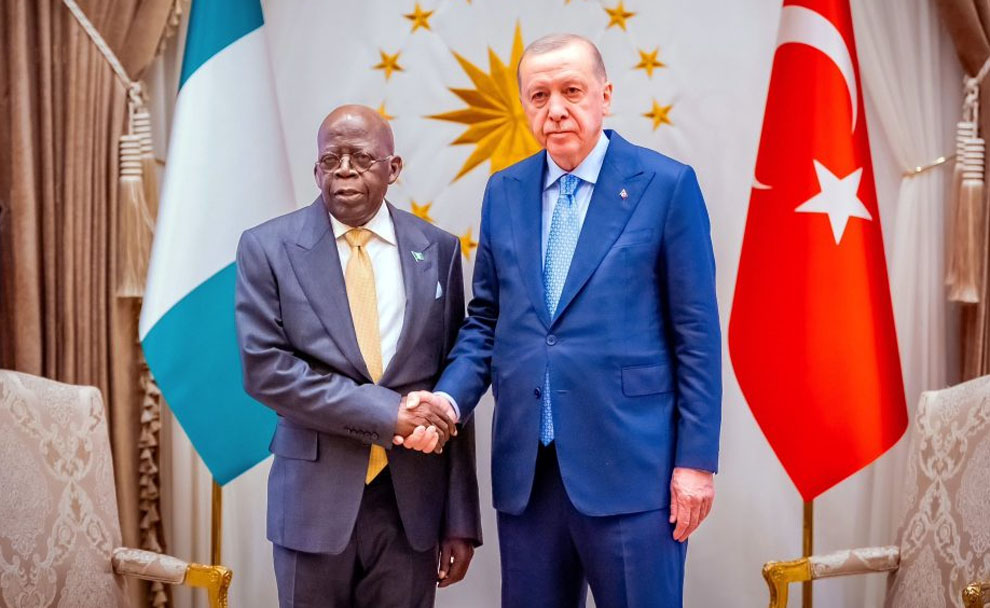
Tinubu Reduces Reliance on U.S, Strengthens Defence Partnerships With Turkey, EU
President Bola Tinubu has commenced a strategic expansion of Nigeria’s defence diplomacy, engaging the European Union (EU) and Turkey to strengthen the nation’s security architecture while reducing overreliance on the United States. The initiative comes as Nigeria faces multiple security threats, including Boko Haram insurgency in the north-east, farmer-herder clashes in the north-central region, separatist violence in the south-east, and escalating banditry in the north-west.
The move coincided with a visit to Brussels by National Security Adviser Mallam Nuhu Ribadu, who led discussions at the first EU-Nigeria Peace, Security, and Defence Dialogue. Both sides agreed to deepen collaboration on regional stability, counter-terrorism, and violent extremism, while enhancing intelligence sharing, maritime security, and cybersecurity cooperation. An EU diplomat in Abuja emphasized that the bloc would provide non-lethal military support, while respecting Nigeria’s sovereignty, describing the EU as “more consistent, more reliable, and more coherent than the United States” in delivering security assistance.
READ ALSO:
- Again, Early Morning Blaze Destroys Dozens of Shops in Kano Market
- Suspected Terrorists Warn Kebbi Residents: Pay ₦100 Million or Face Attack
- ICPC Searches El-Rufai’s Abuja Home Amid Multi-Agency Corruption Investigation
During his state visit to Turkey in January 2026, President Tinubu also held defence discussions with Turkish officials. Turkish companies pledged to supply military equipment, advanced systems, and tactical hardware, while exploring joint local production arrangements with Nigeria. Türkiye is currently regarded as a global leader in armed drones, which could bolster Nigeria’s counter-terrorism operations and reconnaissance capabilities.
Despite these new partnerships, Nigeria continues security cooperation with the United States, including deployments by United States Africa Command (AFRICOM) to support training, intelligence sharing, and operational planning. Recent U.S. personnel arrivals in Bauchi State aim to enhance counter-terrorism capacity without taking direct combat roles, operating under Nigerian command structures.
Analysts say Nigeria’s diversified defence diplomacy seeks to reduce dependency on a single partner, while providing access to a wider range of technology transfer, training opportunities, procurement options, and operational expertise. The strategy also reflects a broader trend of African nations balancing traditional defence alliances with emerging strategic partners to better address evolving security threats.
With regional instability and domestic insurgency on the rise, Nigeria’s engagement with Turkey, the EU, and other partners is expected to strengthen the Nigerian Armed Forces, enhance counter-terrorism operations, and secure national and regional stability.
Tinubu Reduces Reliance on U.S, Strengthens Defence Partnerships With Turkey, EU
-

 News3 days ago
News3 days agoRamadan Begins in Nigeria as Sultan Confirms Crescent Sighting
-

 International1 day ago
International1 day agoCanada Opens New Express Entry Draw for Nigerian Workers, Others
-

 metro3 days ago
metro3 days agoSeven Killed in Horrific Crash at Ota Toll Gate
-

 News2 days ago
News2 days agoKorope Drivers Shut Down Lekki–Epe Expressway Over Lagos Ban (Video)
-

 Health2 days ago
Health2 days agoRamadan Health Tips: Six Ways to Stay Hydrated While Fasting
-

 News11 hours ago
News11 hours agoPolice to Arrest TikToker Mirabel After She Recants False Rape Claim
-

 metro1 day ago
metro1 day agoOsun Awards 55.6km Iwo–Osogbo–Ibadan Road Project to Three Contractors
-

 Entertainment2 days ago
Entertainment2 days agoActress Destiny Etiko Breaks Silence on Alleged Nollywood Betrayal



